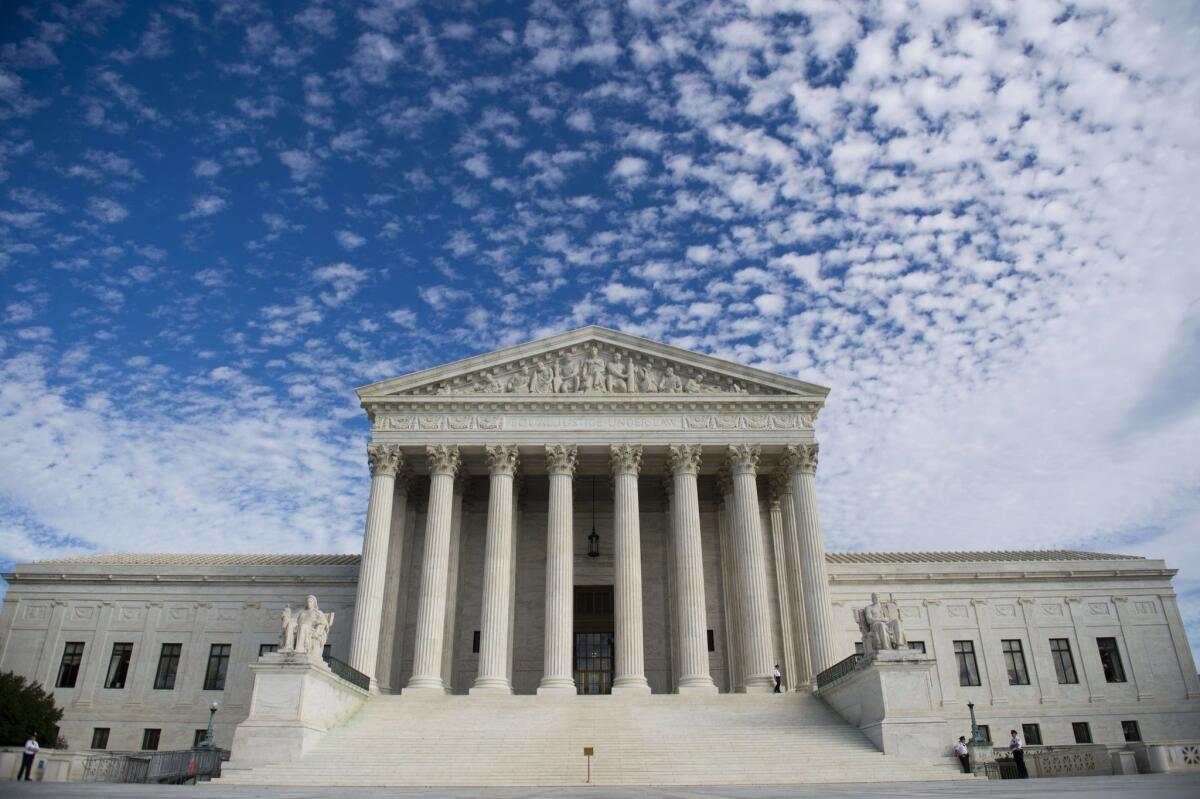Supreme Court rules religious schools should get state grants given to other private schools

The Supreme Court bolstered religious schools on Tuesday, ruling that states that give scholarships or tuition grants to children in private schools may not deny the same aid to parents who enrolled their child in a religious school.
In a 5-4 decision, the court said excluding them amounted to unconstitutional discrimination based on religion and a violation of the 1st Amendment.
The decision is a victory for advocates of school choice, and a setback for those favoring a strict separation of church and state.
Court scholars said the decision in the Montana case marked the first time the court has ruled states must provide aid to children in religious schools, at least under some circumstances.
Montana, like more than 30 other states, has a long-standing state constitutional provision that forbids using tax money to support churches and their affiliates. On that basis, the state supreme court blocked a state-sponsored scholarship program because it gave $500 grants to low-income parents who sent their children to private and parochial schools.
Kendra Espinoza and two other mothers whose children were enrolled in the Stillwater Christian School in Kalispell, Montana sued with the backing of the Virginia-based Institute for Justice.
“A state need not subsidize private education,” Chief Justice John G. Roberts Jr. wrote in Espinoza vs. Montana, joined by the four other conservative justices. “But once a state decides to do so, it cannot disqualify some private schools solely because they are religious.”
The Constitution “condemns discrimination against religious schools and the families whose children attend them. They are members of the community too and their exclusion from the scholarship program here is ‘odious to our Constitution’ and cannot stand,” he said.
Roberts, joined by Justices Clarence Thomas, Samuel A. Alito Jr., Neil M. Gorsuch and Brett M. Kavanaugh, pointed to the anti-Catholic bigotry of the late 19th century, which they said led to the bans on funding “sectarian schools” in most state constitutions. The five conservatives on the court, as well as liberal Justice Sonia Sotomayor, either grew up Catholic or attended Catholic schools.
These state provisions are referred to as “Blaine amendments” because they were based on a failed constitutional amendment sponsored by then-Speaker of the House James G. Blaine, although the proposal originated with President Ulysses S. Grant. In a speech to Civil War veterans in 1875, Grant called for church-state separation and government support for a “good common school education,” not funding for “sectarian schools” that are affiliated with a religion.
Blaine’s proposed amendment said “no money raised through taxation” to support schools shall go to any “under the control of a religious sect.” The proposal won overwhelmingly in the House, but fell just short of the needed two-thirds vote in the Senate. But most states added a similar provision to their state constitutions, including Montana.
“The Blaine amendment was born of bigotry and arose at a time of pervasive hostility to the Catholic Church and to Catholics in general,” Roberts said.
Alito said the Blaine amendments were “prompted by virulent prejudice against immigrants, particularly Catholic immigrants” and had the backing of the Ku Klux Klan.
In their defense, Montana’s lawyers argued that while the state’s provision dates to 1889, the current version was adopted in 1972 in a constitutional convention and did not reflect such bigotry or bias.
Sotomayor joined the court’s other liberals, Justices Ruth Bader Ginsburg, Stephen G. Breyer and Elena Kagan, who are Jewish, to support the separation of church and state, including a ban on government funding of religious schools.
“We all recognize that the 1st Amendment prohibits discrimination against religion,” Breyer wrote in dissent. “At the same time, our history and federal constitutional precedent reflect a deep concern that state funding for religious teaching, by stirring fears of preference or in other ways, might fuel religious discord and division and thereby threaten religious freedom itself.”
Advocates for school choice say only a handful of states provide grants or scholarships for children enrolled in private elementary or secondary schools, but the court’s decision in favor of religious schools could encourage more of them to do so.
“It was high time for the Blaine amendments to bite the dust,” said Diana Verm, counsel for the Becket Fund on Religious Liberty. “Our Constitution requires equal treatment for religious people and institutions. Relying on century-old state laws designed to target Catholics to exclude all people of faith was legally, constitutionally, and morally wrong.”
Rachel Laser, president of Americans United for Separation of Church and State, called the decision a setback for religious freedom.
“Forcing taxpayers to pay for private religious education — as Montana’s tax-credit voucher program does — is a fundamental violation of their religious freedom,” she said. It also “has the effect of forcing Montana taxpayers to support a program that funds discrimination. Too often, religious schools reject civil rights for women and LGBTQ people.”
More to Read
Get the L.A. Times Politics newsletter
Deeply reported insights into legislation, politics and policy from Sacramento, Washington and beyond. In your inbox three times per week.
You may occasionally receive promotional content from the Los Angeles Times.







